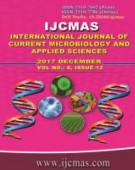


 National Academy of Agricultural Sciences (NAAS)
National Academy of Agricultural Sciences (NAAS)

|
PRINT ISSN : 2319-7692
Online ISSN : 2319-7706 Issues : 12 per year Publisher : Excellent Publishers Email : editorijcmas@gmail.com / submit@ijcmas.com Editor-in-chief: Dr.M.Prakash Index Copernicus ICV 2018: 95.39 NAAS RATING 2020: 5.38 |
In present investigation uard (Vigna mungo (L) Hepper), chickpea (Cicer arietinum L) and moong (Vigna radiata (L) R Wilczek) were studied for isolation, identification, biochemical and antibiotic activities characterization of Rhizobium strains. A total of 37 samples were screened out of which 27 samples of Cicer arietinum, 5 samples of Vigna mungo and 5 samples of Vigna radiata were collected from different fields of surrounding area of Muzaffarnagar, Uttar Pradesh. On the basis of white mucoid growth on YEMA medium only 3 samples from Vigna mungo, 18 (Cicer arietinum) and none of sample Vigna radiata from were found positive for the presence of Rhizobium. In Gram staining reaction all the 21 (18 from chickpea and 3 from uard) isolates were found Gram-negative and rod shaped. Biochemical characterization of Rhizobium strains showed that all the 21 isolates have negative reaction with Citrate utilization test, Starch utilization test was positive with all isolates except for U1, C3, C13 and C24, Glucose peptone agar test was positive with all isolates except for C 18, negative results were found with Gelatin test for all isolates and Catalase test was found positive for all isolates. All the isolates were found sensitive to Ciprofloxacin (Cf) except C12 which was partially resistant, Ofloxacin (Of) except C2 which was partially resistant. Norfloxacin (Nx) was susceptible to 11 isolates, resistant to 7 isolates and partial resistant to 3 isolates. Levofloxacin (Le) and Gatifloxacin (Gf) were susceptible to all isolate but Levofloxacin (Le) was partial resistant to C3, C8 and C14. All the isolates, on the other hand, showed resistance to antibiotics Aztreonam (Ao) and Co-trimoxazole (Co) were showed resistant while Nitrofurantoin (Nf) showed partial resistance to isolates with few exception.
 |
 |
 |
 |
 |